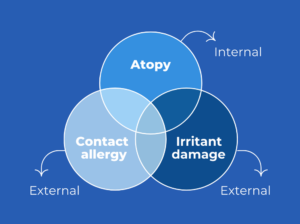Practical tips and treatments for managing hand eczema
Hand eczema, or hand dermatitis, can be particularly challenging – especially for those constantly exposed to irritants or frequent handwashing. Whether you’ve recently been diagnosed or have managed hand eczema for years, relief is within reach with the proper care strategies.
Causes:
Hand eczema occurs because of a combination of internal factors (i.e. damaged skin barrier on the hands) and external factors (i.e. irritants or allergens you touch).
The interplay of internal and external triggers causes hand eczema.

Atopy – an impaired skin barrier and immune system prone to atopic eczema contributes to hand eczema.
Contact allergy – coming in contact with an allergy can trigger a flare and can trigger hand eczema.
Exposure to irritants – coming in contact with irritants can trigger a flare and can trigger hand eczema.
Treatment:
- Lifestyle changes can help hand eczema, proper skin care and avoiding triggers when possible.
- Moisturizing the skin and using gentle cleansers are the first defence against hand eczema. Apply a rich moisturizer immediately after hand washing, bathing, wet work, and anytime in between.
- Many treatments for hand eczema include creams or ointments that range in potency. A qualified health care professional can guide you on a treatment plan, and sometimes a specialist like a dermatologist may be needed to help you treat your condition if it does not improve.
- If your hand eczema has cleared up and you are no longer using your prescription treatments, continue with a diligent moisturizing routine.
Tips for living with hand eczema:
- Where possible, avoid or minimize wet work and excessive hand washing.
- Protect hands by using cotton gloves as liners under vinyl gloves.
- Avoid the substance(s) causing the irritation or allergy. Avoiding all substances can be very difficult – if not impossible – especially if these substances are encountered at work. Using barrier cream, wearing gloves, and practicing glove hygiene is often helpful.
- Shampoo and style hair while wearing vinyl gloves, if possible.
- Use moisturizers frequently to help restore normal skin barrier function. A thin smear of a thick barrier cream should be applied to all affected areas before work and reapplied after washing and whenever the skin dries out.
- Manage stress – stress triggers flare-ups in many people so reducing stress may be beneficial.
For additional care management and tips, check out Eczema Society of Canada (ESC)’s new Hand Eczema Care Basics resource.
The Eczema Society of Canada thanks Dr. Sonja Molin, MD (dermatology) and Dr. Robert Bissonnette, MD, FRCPC (dermatology) for their volunteer contribution to this educational content.
This blog was developed as part of our Educational Content program, and funding support for this initiative has been provided by AbbVie, Arcutis Canada, Inc., Eli Lilly Canada Inc., Incyte Biosciences Canada, and LEO Pharma Inc.
Disclaimer: Information provided in this resource does not constitute medical advice and is not intended to be used as a diagnostic tool. The information is up-to-date at time of publication. All medications, interventions, and treatment plans have risks and benefits, and it is important that individuals discuss their or their child’s specific health care needs with a qualified health care professional.
November 2024
